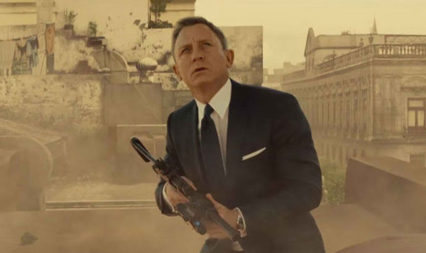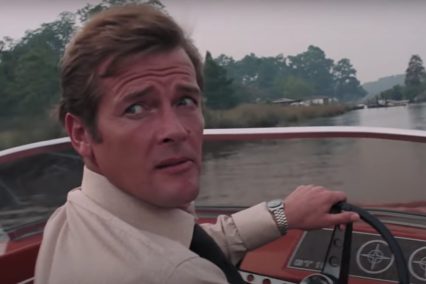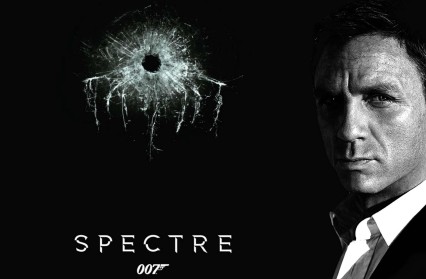Craig Austin shares his lifelong fascination with the iconic character James Bond ahead of the newest Daniel Craig 007 adventure Spectre.
Upon the release of Eon Productions‘ 24th instalment of the James Bond franchise it’s about time I put my cards on the (baccarat) table. I love Bond. And by that I mean that I really love Bond. To my knowledge, and in the sense of Bond being an unreserved and irrational cultural obsession, only my good friend Caroline comes close; and Caroline even loves the Brosnan ones, so it’s hard to argue that her judgment is anything other than fundamentally flawed.

I love Bond to the extent that I know that the original gun barrel title sequence was designed by Maurice Binder, that Fleming had originally requested that Christopher Lee (the author’s cousin, no less) be cast as Dr No, and that Blondie’s sublime and cruelly ignored pitch for the theme of For Yours Eyes Only remains both the finest and definitive version of that instalment’s vision; in this writer’s mind at least, and irrespective of what Cubby Broccoli might have thought at the time.
As a child, Bond was the cultural glue that bonded me to my father in a way that music, books and (ironically) traditionally masculine pursuits completely failed to do. In our South Wales home Bond was Kenny Dalglish, Barry John, Keith Richards and ‘Hurricane’ Higgins rolled into one, a welcome injection of 60s glamour into an otherwise sleepy Sunday evening TV schedule; a fleeting glimpse of an uncharted world to be explored and devoured and an ideal, if not for living, then for sheer unadulterated escapism and barefaced renegade allure.
But everyone loves Bond, don’t they? Even the schmucks who claim to hate Bond, secretly adore Bond. Because not liking Bond is a stance akin to not liking The Beatles. It’s not an opinion, it’s a pose. And in so many ways Bond is The Beatles. The Beatles in Hamburg, that is. The crazed Beatles, the pumped up on amphetamines and transient sex Beatles, the ruthless Beatles, the clandestine Beatles. Yes, Len Deighton’s reconstructed secret agent Harry Palmer remains a valid and exquisite alternative to Bond of course, but Harry Palmer doesn’t exist anymore, at least not in a creative sense, and Harry Palmer is only almost as good as Bond (in spite of his undeniable champignon creativity). He’s just simply not Bond.
Palmer, by way of contrast, remains The Kinks to Bond’s Beatles; the street-smart embodiment of chippy London swagger and unapologetic dandy conceit. And being The Kinks is completely and utterly brilliant. It’s just not as good as being The Beatles. In the realm of western popular culture nothing is as good as being The Beatles. Just as, paradoxically, nothing is as good as being Bond.
The only problem being, that The Beatles (and Lennon in particular) were a bunch of degenerates. A wonderfully talented and visionary bunch of degenerates admittedly, but degenerates nonetheless, albeit exactly Bond’s kind of degenerates: a wilful contradiction of appalling hypocrisy, vindictive ruthlessness, and shameless self-interest. Like Bond, they were truly magnificent and unspeakably awful in equal measures. But you don’t let that spoil it all for you, do you? Not unless you’re a fool.

In much the same way, the unapologetically right-wing Bryan Ferry (a wannabe Bond in tuxedo and libido, if not the assassin’s credo) contends that artists ‘who did even revolutionary work were often quite bourgeois in their life and their tastes’. Yet it’s an analysis that in no way dilutes the visceral delight of either Roxy Music’s ‘Pyjamarama’ or ‘Out of the Blue’. Roxy’s creative majesty exists beyond the reach of those who seek to taint it with self-righteous perceptions of its singer’s partisan decadence. Artistically, it still represents an undeniably magnificent feast. And to deny yourself its abundant pleasures based on either Ferry’s politics or his awful son represents the thinnest of all self-imposed gruel, a renunciation of the exquisitely contradictory nature of contemporary art.
Accordingly, you can like Bond, adore Bond even, without it ever defining you as some kind of watch-fixated neo-con meathead. You might even aspire to delve beneath the franchise’s marketing campaigns and vulgar commercial tie-ins to explore the often subversive themes at the heart of the Bond canon; the idiocy of our elected officials, the dispensability of humanity, and the damaged dysfunctional mind-set of Bond himself; a man haunted and traumatised by the untimely death of his parents in ways that conspicuously parallel those of the Batman.
Fittingly, when Bond asks Ben Whishaw’s ‘Q’, in the series’ latest instalment SPECTRE, ‘Could you do one more thing for me?’ Q’s response, ‘And that would be?’ is met with a rejoinder from the establishment’s executioner-for-hire that might have easily have emanated from the handbook of the perpetual outsider. A seemingly desperate plea for emancipation and renaissance: ‘Make me disappear’.

In SPECTRE 007 goes rogue again, because these days 007 always goes rogue; an increasingly irksome theme no doubt intended to hint at our anti-hero’s recently acquired ‘vulnerability’ and attendant melancholy. One somewhat at odds with the film’s breathtaking opening set-piece in which Bond punches a helicopter pilot’s face off as they tangle perilously above Mexico City’s crowded Zócalo.
In a post 9/11 world Bond’s propensity for ‘going rogue’ also underlines the degree to which all bets are off in a way that even the most astute Las Vegas croupier could not even countenance, the casino concept of ‘faites vos jeux’ having taken on financial and geo-political notions far beyond the perimeter of either democracy or art. In 2015 even the ‘Double O’ programme itself appears to be at the mercy of austerity-driven cuts, the queasy spectre of George Osbourne perfectly embodied by Andrew Scott in the role of MI6’s archetypal ‘little shit’, Denbigh. To this extent this is a Bond film like no other, the untethered excesses of criminal capitalism presented without dilution or artifice, most notably in the SPECTRE organisation’s positioning of its proud and apparently successful record of trading women and children within ‘the leisure sector’.

SPECTRE‘s underlying theme, that of the future ruthlessly obliterating the past, lends itself to numerous knowing references to the ongoing debate about the cultural relevance of 007 himself (a somewhat anomalous notion given Skyfall having hit such serious box office pay dirt). Yet, while Daniel Craig is on record as being actively complicit in Casino Royale’s thematically austere reboot, this latest instalment takes mischievous delight in continuing to drip-feed some of the series’ most totemic tropes back into the heady mix. From the Live and Let Die homage that is the splendid Día de Muertos opening sequence, to the fleeting mention of Felix Leiter, and the recurrence of cinema’s most ominous snow-white feline, this is perhaps the most self-referential Bond since the creaking days of Roger Moore.

As ever, the role of women continues to be a notoriously problematic challenge for any Bond film given the series’ less than enlightened heritage. Much has been made of Monica Bellucci’s relatively short-lived appearance, given that at the age of (shock! horror!) 51 she represents a female foil who might conceivably have attended school at the same time as 007 – as opposed to being a foetus-in-waiting. Naomi Harris’s ‘Eve Moneypenny’ excels in a role determined to break free from its regressive historic shackles, and aside from a clichéd From Russia With Love-aping train sequence that can’t decide whether it’s most aroused by its carnality or its weaponry, Lea Séydoux’s ‘Madeleine Swann’ embodies a resolute and unyielding ‘Bond girl’ characterisation mostly unencumbered by her unedifyingly-monikered predecessors.
SPECTRE succeeds in matching the giddy visceral thrills of the habitually lauded Skyfall without ever allowing itself to become ensnared in the tentacles of its forerunner’s occasionally uncomfortable ideological excesses. It’s the perfect embodiment of a series finally at ease with the notion of ‘Bond’, one that expertly negotiates the precarious tightrope that connects brutality with humanity. It’s therefore something of a calamity that its theme song – so often the evocative canvas upon which the tone of a Bond film is incrementally revealed – is so irredeemably weedy. Sam Smith may well present a suitably commercial proposition for a contemporary audience demographic, but the unforgivably insipid nature of ‘Writing’s On the Wall’ exposes SPECTRE’s true crime; one that Lana Del Ray, who in ‘Honeymoon’ wrote the alternative Bond theme regardless, should refuse to forgive for as long as there are blim-holes in her Venice Beach sundresses.
Though this is not the Bond film that would necessarily have united my father and I in the way that its earlier incarnations succeeded in doing (though we’ll soon find out) it is a Bond film – in the finest Fleming tradition – that fittingly resonates with the heady impact of an overpriced Mayfair martini.
Dirty, intoxicating, and the guiltiest of pleasures.
Craig Austin is a Wales Arts Review senior editor.
____________________________________________________________
Recommended for you:
The Wild Geese | Becoming Richard Burton
The ‘Becoming Richard Burton’ / ‘Bywyd Richard Burton’ exhibition is now reopened at the National Museum Wales and Wales Arts Review is publishing a series of essays to run concurrently with the exhibition, curated by Daniel G. Williams, director of the Richard Burton Centre at Swansea University. Each essay will discuss a specific Burton film; this week, Dr Gethin Matthews examines The Wild Geese (1978).
____________________________________________________________











